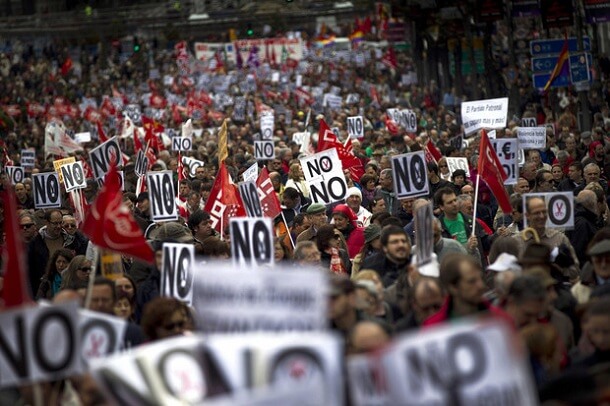By Elpida Papoutsaki
“Nuit Debout” is an ongoing movement in France, aimed among other things at securing the withdrawal of the proposed labor reforms. The first major demonstration took place on March 31, 2016, since when unrest has literally soared. “Nuit Debout”, which means “Up All Night”, is expressed through public discussions in occupied public squares, such as the Place de la République in Paris. At the forefront are students and unemployed youth and workers, with the trade unions playing an important role in demands for withdrawal of the labor reform but not monopolizing the resistance as a whole. Several other issues have been stressed, including climate change, the need for changes in the justice system, unemployment, the new surveillance laws, the demand for abolition of the “state of emergency” imposed in the wake of last November’s terrorist attacks, the European Union’s democratic deficit, the unacceptability of capitalism, (Chrisafis, 2016).
The core of the problem and the issue that triggered the public unrest, though perhaps just the tip of the iceberg, is France’s labor reform bill, also referred to as the “El Khomri law”. According to “France Unemployment Rate 1996-2016”, the unemployment rate stood at 10.2 % in the first quarter of this year, 2016, having fluctuated mildly and risen to 10.5% in 2015. Furthermore, the long term unemployment rate has varied between 2.4 and 5% in the time period 1996-2016 covered by the study; the rate of youth unemployment has been between 14.5 and 26.2% in the same period, (). Originally demanded by the European Commission in Brussels, the labor reform is the way for President Hollande to tackle unemployment by liberalizing the law, making it easier for businesses to hire employees, without any strict rules on rights to hinder their decisions, (24, 2016). Opponents of the reform argue that the bill will deepen the insecurity caused by mass unemployment and temporary contracts (CDDs). They oppose any attempt to touch permanent contracts, even though these are so demanding that employers simply avoid them. Most of the youth is hired through an internship or a CDD. Market-oriented commentators stress the need to loosen up the law imposing restrictions on working hours, reducing overtime payments and making it easier for companies to lay off workers. This will enable the companies to be guided by the invisible hand of the market, hiring whenever they need staff and not being obliged to have second thoughts about what will happen when things go badly in the economy and they have to pay large sums in compensation, prompting them not to take the step of hiring workers in the first place, (2016).
There is a dividing line within the socialist party over this issue. On the one hand there is the traditional statist Keynesian approach, on the other the approach of the “second left”, which favours budget discipline and market oriented policies. It is the “second left” that has introduced the reform, in keeping with European economic policy as it has evolved over the preceding decades. France’s national policy in 2016 corresponds to a broader consensus on economic policy within the EU institutions.The EU and almost every existing institution in the modern world abides by the rules of the free market, with certain deviations of course. That is what is behind the ongoing unrest. There is one system, that of the free market, and it is held to be the only way of doing things.
There is no strong alternative. The Cold War is in the past and the Marxist movements seem to have lost their influence.
Demands and hopes for an alternative solution are, however, undeniably on the rise. The alternative way is being discussed not only in terms of economic policy within France or the EU, but also in terms of new ways of governance, the need to change institutions in order to make them more democratic. Concern at Europe’s democratic deficit, which has been an important topic of debate over the past few years, has now been joined by the French protesters’ concern at the State of Emergency imposed on them as safety measure after the terrorist attacks of last November. Some commentators argue that there is a resemblance between the “May 1968” movement and “Nuit Debout”. Others say that “Nuit Debout” is a farce (). There are common elements: the demonstrations have a social background supporting them. The unrest has paralyzed the city for more than a few days. The local issues have a bearing on global issues. The protests give rise to political debates and further conversation. As was the case with “May 1968”, the government is going to prevail. The protesters will submit to the will of the stronger party, the party with greater endurance, which is the state. But a breach has opened up and in the aftermath of it we will witness changes, introduced gradually, out of the ashes of a crisis.
References:
Chrisafis, A. (2016). Nuit debout protesters occupy French cities in revolutionary call for change. Retrieved June 04, 2016, from http://www.theguardian.com/world/2016/apr/08/nuit-debout-protesters-occupy-french-cities-in-a-revolutionary-call-for-change
France Unemployment Rate | 1996-2016 | Data | Chart | Calendar | Forecast. (n.d.). Retrieved June 04, 2016, from http://www.tradingeconomics.com/france/unemployment-rate
24, F. (2016). French unemployment hits new record. Retrieved June 04, 2016, from http://www.france24.com/en/20160324-french-unemployment-hits-new-record
Why France’s labour reforms bill is a ‘complete disaster’ (2016). Retrieved June 04, 2016, from http://www.thelocal.fr/20160406/why-frances-labour-reforms-bill-is-a-disaster-el-khomri
More fuel frustration as French pickets refuse to back down. (n.d.). Retrieved June 04, 2016, from http://www.euronews.com/2016/05/25/more-fuel-frustration-as-french-pickets-refuse-to-back-down/
« Nuit Debout », l’anti-mai 68. (n.d.). Retrieved June 04, 2016, from http://www.marianne.net/elie-pense/nuit-debout-anti-mai-68-100241834.html











